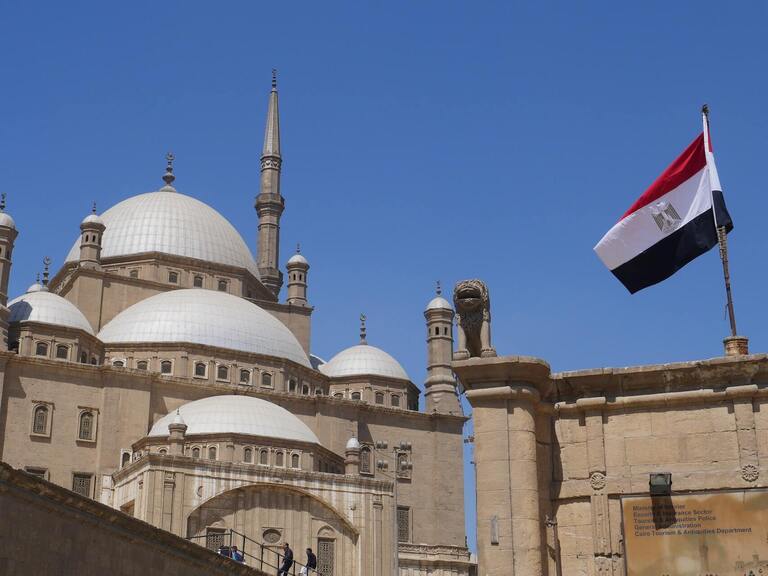An Anatomy of Turkish Foreign Policy: 1995 – 2020, Issue #8: Turkey & Egypt
Introduction
This study is the eighth bilateral analysis of Turkish Foreign Policy (TFP) in the research project titled: “An Anatomy of Turkish Foreign Policy.” Our goal is to quantify TFP’s evolution between 1995 and 2020 through a data-driven account free of speculative remarks. In this analysis, we will focus on the development of Turkey’s bilateral relations with Egypt. In doing so, we will begin with a quantitative analysis of the relations to provide an overview. Next, we will survey the notable events between the two countries that impacted bilateral relations.
The Data
We use data from the publicly available Lockheed Martin Advanced Technology Lab’s Integrated Crisis Early Warning System (ICEWS) event database in the present analysis. We discuss the methodology in Issue #1 of this series.[1] In brief, ICEWS features information on directed dyadic interactions between countries (i.e., Turkey-Egypt), where each observation includes details of who (source) did what (action) to whom (target), when (time), and where (location). Each interaction is then assigned an intensity score that ranges between -10 and +10 based on the category of the interaction. Negative interaction intensity scores imply conflict, and positive interaction intensity scores indicate cooperation. We calculate monthly and annual averages of the intensity scores to form indices.
Turkey – Egypt Relations: An Overview
How frequently does Turkey interact with Egypt, and what is the nature of its interactions? In Issue #1, we demonstrate that Egypt is one of the top interaction partners of Turkey. The aggregate interaction frequency suggests that the total is the fourteenth highest between January 1st, 1995, and April 30th, 2020. ICEWS features 2955 observations with Egypt within this timeframe, of which 924 are unique interactions.[2] This number corresponds to slightly above one and a half percent of Turkey’s total interactions of 186,255. Table 3.1 below compares the summary statistics of Turkey’s directed dyadic interaction intensity scores with Egypt and the rest of the World.

The summary statistics in Table 3.1 provides a good overview of the overall interactions’ essence. The higher average intensity score of 2 between Turkey and Egypt compared to the 1.34 between Turkey and the World suggests that Turkey’s relations with Egypt vis-à-vis the World were, on average, more cooperative throughout the last two and a half decades. This difference can also be qualitatively captured by exploring the shapes of the distributions. Figure 3.1 and Figure 3.2 below are event intensity score distributions. In both distributions, any value to the left of 0 suggests a conflictual interaction and to the right suggests a cooperative interaction. We also include the results of a simple difference-in-means test in Table 3.2, which indicates a statistically significant difference in the average intensity of interactions towards Egypt compared to the World.
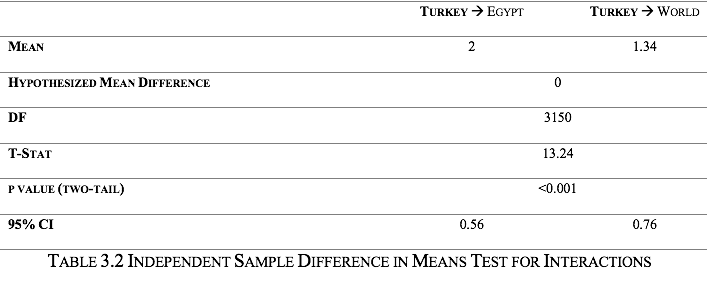
Looking at the relations between Turkey and Egypt exclusively, the summary statistics from Table 3.1 suggest the instances of cooperation between the two countries were slightly more than instances of conflict, given the negative skewness in the data’s distribution.
What was the variation in the frequency of bilateral interactions over time? Figure 3.3 below demonstrates the frequency of both cooperation and conflict initiations by Turkey toward Egypt by year. It should be noted that this figure does not take into account the magnitude of cooperation or conflict. The figure suggests the presence of three phases. The first phase between 1995 and 2002 is marked by low interaction initiation. The second phase, which spans 2002 and 2013, features an increasing frequency of cooperative interaction initiations. During this time, the frequency of conflict initiation remains steady and low. The year of 2013 during when the Egyptian coup d’état unfolded, marks the beginning of the third phase.
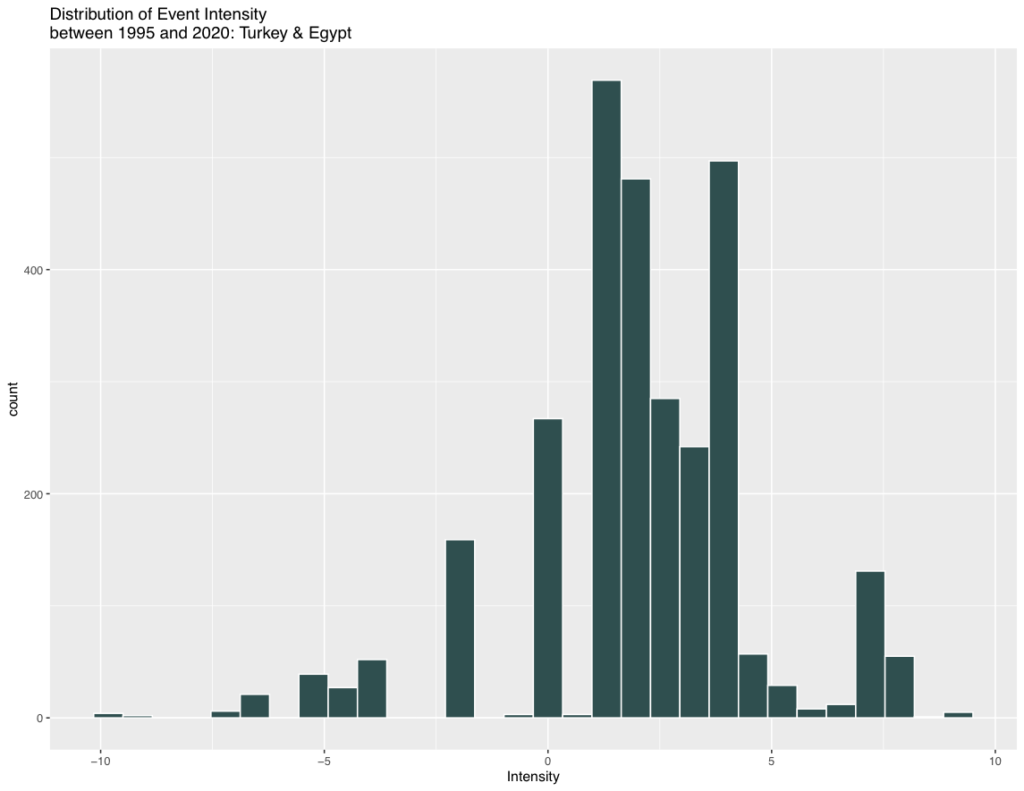
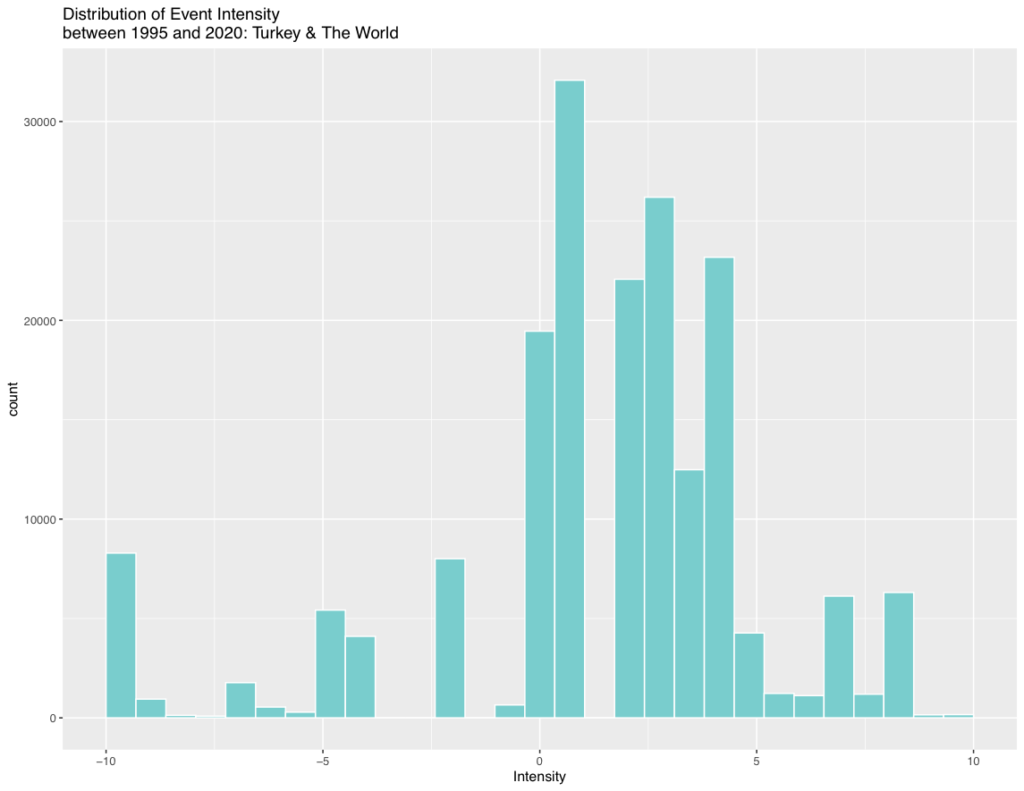
The disaggregation of interaction frequency by intensity over time provides further information. Figure 3.4 demonstrates the annual distributions of interactions. The distribution at the bottom displays the values for 1995 and the one at the top for 2020. As always, while 0 marks neutral events, any interactions that are located to the right of 0 are classified as instances of cooperation, and to the left are instances of conflict. The magnitude of interaction intensity increases as it approaches the minimum and maximum values (10 and -10). The figure remains steady overall until 2013. Following the military takeover of the country, relations begin to deteriorate gradually. Figure 3.5 demonstrates the variation in relations during a given government.[3] The intensity and frequency of interactions with Egypt are at their highest during the 59th, 60th,61st governments. Most confrontations take place during the 61st government.
States actively react to signals that they receive from their counterparts and adjust their foreign policy towards them. An index can be particularly useful for understanding the overall evolution of the signals in bilateral relations. Our most noteworthy contribution in this report is the index of bilateral relations between Turkey and Egypt. We present the index in Figure 3.6.
To draw our overall dyadic relations index, we begin with calculating a simple monthly intensity average of all interactions for a given month. The values of these averages are displayed with the black dots in Figure 3.6. A dot above zero suggests that the interactions for the month were cooperative, and a dot below suggests otherwise. Next, we move on to the trendlines. An upward-pointing trendline suggests an improvement in the bilateral relations and an increase in cooperation, whereas a downward-pointing trendline suggests growing discord, regardless of its color. We first focus on the short-term trends and calculate a six-month moving average. This line shows the average intensity scores considering the preceding six months and is displayed with the red line in Figure 3.6. This trendline describes the short-term cascades in which the two countries interact with each other. Finally, we turn to the long-term and fit a non-parametric locally weighted smoothing line among all the monthly averages, which is displayed with the blue line in Figure 3.6. The grey band around the blue line shows the 95% confidence intervals. This line captures the trend in the long-term evolution of bilateral relations between Turkey and Egypt. Parallel to findings above, the line suggests a significant decline in bilateral cooperation over time.

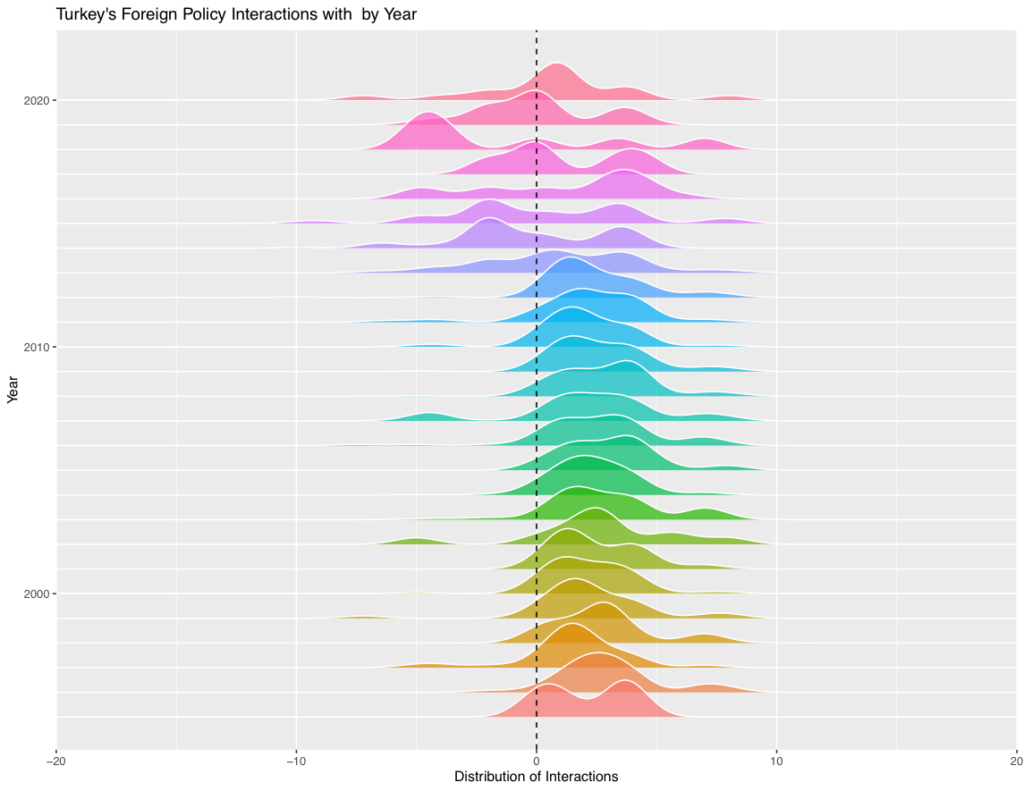
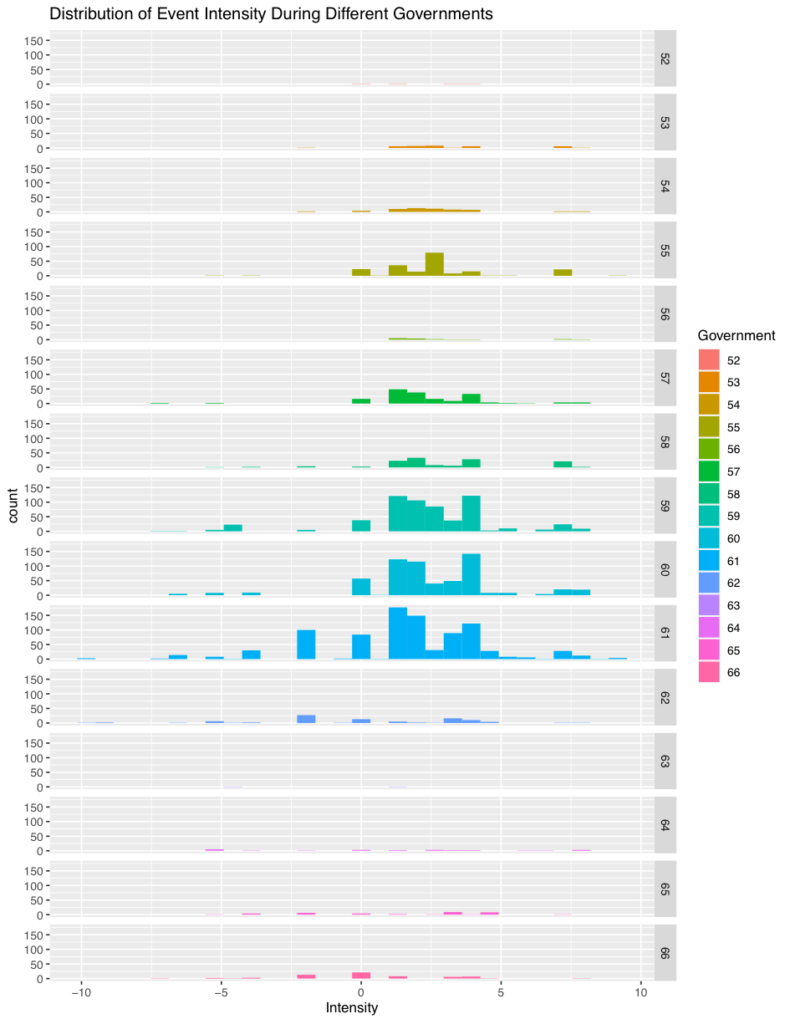

Defining Moments in Turkey – Egypt Relations
What are the momentous events that defined the relations between Turkey and Egypt? In this section, we focus on the milestones that defined the bilateral relations within the past two and a half decades between the two countries. We use the ICEWS intensity variable for filtering individual milestone interactions.
Participation In D-8 Proposal, 3 October 1996
Turkish Prime Minister Necmettin Erbakan visited Egypt in which he offered Egypt to join the Islamic economic group for forming Group of Eight countries. [Source]
Establishment of D-8, 15 June 1997
The D-8 Organization for Economic Cooperation was established with the Istanbul Declaration at the summit of the Heads of State and Governments of Bangladesh, Indonesia, Iran, Malaysia, Egypt, Nigeria, Pakistan, and Turkey on 15 June 1997 under the leadership of Turkish Prime Minister Necmettin Erbakan. Erbakan established the D-8 as an international organization to ensure cooperation between Muslim-majority nations in development and to increase trade and cooperation between member countries. [Source]
Mubarak’s Mediation Proposal, 7 October 1998
Egyptian President Hosni Mubarak visited Ankara to mediate the escalating crisis between Turkey and Syria. Ankara declined Mubarak’s mediation proposal. [Source]
Mubarak Hosts Demirel, 27 July 1999
President Suleyman Demirel met with Egyptian President Hosni Mubarak at Egypt’s Ras El Tin Palace. Before the visit, Demirel noted that the sides aim to deepen the cooperation between the two countries in every field. [Source]
Turkey-Egypt FTA, 27 December 2005
A free trade agreement (FTA) was signed between Turkey and Egypt. The agreement was signed during President Ahmet Necdet Sezer’s visit to Egypt, with the participation of State Minister Kursad Tuzmen and Egyptian Minister of Foreign Trade and Industry Rashid Mohammed Rashid. [Source]
Dialogues On Regional Politics, 21 May 2006
Prime Minister Recep Tayyip Erdogan met Egyptian President Hosni Mubarak. The sides deliberated on regional issues. Two topics that received particular attention were Iraq and bilateral trade relations. [Source]
Implementation of the Turkey-Egypt FTA, 1 March 2007
Turkey and Egypt officially started free trade on March 1, 2007, with the relevant Cabinet Decision’s release for the agreement’s approval on the official gazette. [Source]
Arab Gas Pipeline, 6 April 2007
Trilateral talks between Egypt, Syria and Turkey were held on the construction of the Arab Gas Pipeline. Turkish Energy Minister Hilmi Guler announced that they discussed the last part of the project of the 230-kilometer line between Kilis and Syria. Guler also indicated that this pipeline may become an alternative route for purchasing energy in line with the country’s diversification efforts. [Source]
On Military Cooperation, 14 April 2008
Turkey’s Chief of General Staff General Yasar Buyukanit visited Egyptian Defense Minister Hussein Tantawi. Turkey and Egypt discussed the possibility of military cooperation between two countries. [Source]
On the Palestinian Issue, 11 February 2009
Turkish President Abdullah Gul met Egyptian President Hosni Mubarak in Istanbul. Gul noted that Turkey appreciates Egypt’s support towards facilitating reconciliation among the Palestinians and that the Turkey is providing its full support for the peace efforts. [Source]
On Tahrir Square Protests in Egypt, 1 February 2011
Prime Minister Recep Tayyip Erdogan supported the protests against Egyptian President Hosni Mubarak. In his speech at the Grand National Assembly of Turkey, Prime Minister Erdogan said that Mubarak “must listen the humanitarian demands of Egyptian people.” [Source]
Resignation of President Hosni Mubarak, 11 February 2011
President Hosni Mubarak, who was in power for thirty years in Egypt, resigned after protests and demonstrations that started in Cairo. [Source]
Support for Prime Minister Sharaf, 14 September 2011
Prime Minister Recep Tayyip Erdogan visited Egypt for an official visit to show his support for Muslim Brotherhood-backed Prime Minister Esam Sharaf. [Source]
Joint Committee Meeting, 5-6 March 2012
The Joint Committee meeting for Turkey-Egypt Economic and Trade Relations was held on 5-6 March 2012. [Source]
High-Level Commercial Negotiations Committee, 16 November 2012
The High-level Commercial Negotiations Committee for Turkey-Egypt Economic and Trade Relations was held on of November 2012. [Source]
Protesters Endorsed, 17 November 2012
Prime Minister Recep Tayyip Erdogan visited Cairo University as part of his Egypt trip. He said, “with your revolution, you have shown the whole world that oppression cannot stand forever” to the Egyptian university students. [Source]
Business Council of Turkey and Egypt Meeting, 10 May 2013
The Business Council of Turkey-Egypt met in Cairo to strengthen bilateral economic and trade relations. [Source]
Turkey Sends Garbage Trucks to Egypt, 28 May 2013
Prime Minister Recep Tayyip Erdogan sent one hundred and fifty garbage trucks to Egypt through the Ministry of Environment and Urbanization. [Source]
Egyptian Coup D’état, 3 July 2013
Egyptian Armed Forces carried out a coup under the Chief General Abdel Fattah al-Sisi and took President Mohammed Morsi into custody. [Source]
U.N Security Council to Back Morsi, 15 August 2013
Turkish Prime Minister Recep Tayyip Erdogan called on the United Nations Security Council to convene and discuss the developments in Egypt. [Source]
On Morsi’s Ouster, 21 August 2013
Turkey’s incumbent Justice and Development Party denounced Mohammed Morsi’s ouster and attacks on Muslim Brotherhood supporters. [Source]
Deteriorating Diplomatic Relations, 23 November 2013
Egypt declared the Ambassador of Turkey as persona non grata. In response, Turkey reciprocated by declaring Ambassador of Egypt as persona non grata. [Source]
Turkey Joins the “Islamic Alliance Against Terrorism”, 15 December 2015
Saudi Arabia announced the formation of an “Islamic Alliance Against Terrorism” against ISIS with thirty-three participants, including Turkey and Egypt. [Source]
Eastern Mediterranean Sea Issue, 20 September 2018
Turkey’s Energy Minister indicated that Turkey will not allow any unilateral hydrocarbon drilling or exploration in the Eastern Mediterranean Sea. At that week according to the Greek Ekathimerini newspaper, Egypt signed an agreement on for the construction of a sub-sea pipeline to export natural gas from the Cyprus Island to Egypt. [Source]
Turkey Detained Egyptians in the Eastern Mediterranean Sea, 22 September 2018
Turkish naval forces detained a Cypriot fishing vessel with four Egyptian fishermen after Turkey’s Energy Minister’s announcement on the Eastern Mediterranean Sea. [Source]
Eastern Mediterranean Gas Forum, 14 January 2019
The Eastern Mediterranean Gas Forum was established in Egypt with the participation of seven ministers of energy. Turkey was not invited to the forum. [Source]
Egypt on the Armenian Issue, 18 February 2019
Egyptian President Abdel Fatah al-Sisi said “In Egypt, we have five million refugees (registered and unregistered), who do not live in camps. They have been treated as we dealt with Armenians (refugees) hundred years ago, when Egypt hosted them after the genocide.” [Source]
On Meeting Sisi, 23 February 2019
On a live broadcast, Turkish President Recep Tayyip Erdogan denounced Egyptian President Sisi’s coup and said, “Why is Recep Tayyip Erdogan not meeting Sisi? … I would never meet such a person.” [Source]
On the Egyptian Government, 27 February 2019
Turkish President Recep Tayyip Erdogan said, “If we lose, the enemies of Islam from Europe to America, will almost free from their chains.” [Source]
Eastern Mediterranean Geopolitics, 23 August 2019
President Recep Tayyip Erdogan said Turkey will continue its hydrocarbon exploration operations in the Eastern Mediterranean. He added, “Any project that ignores either Turkey or the Turkish Republic of Northern Cyprus cannot be implemented in the Eastern Mediterranean.” [Source]
Turkey’s Delimitation Agreement with Libya, 8 December 2019
Ankara signed a memorandum of understanding with Libya’s Government of National Accord on maritime boundary delimitation. In response to this agreement, Egyptian Foreign Ministry noted that “such documents have no legal effects and cannot be recognized.” [Source]
On Turkey’s Diplomatic Engagement in the Region, 8 January 2020
France, Greece, Egypt and Cyprus declared that agreements between Ankara and Libya assigning Turkey’s rights over a vast area of the eastern Mediterranean were “void.” [Source]
[iheu_ultimate_oxi id=”27″]
[1] Lautenschlager, Jennifer, Steve Shellman, and Michael Ward. 2015. “ICEWS Event Aggregations.” Harvard Dataverse V3.
[2] Notable events are captured by multiple news agencies leading to repetitions in the dataset.
[3] There are fifteen governments in our timeframe. The terms of these governments are as follows: the 52th Government of Turkey, October 30th, 1995, to March 6th, 1996; the 53th Government of Turkey, March 6th, 1996, to June 28th, 1996; the 54th Government of Turkey, June 28th, 1996, to June 30th, 1997; the 55th Government of Turkey, June 30th, 1997, to January 11th, 1999; the 56th Government of Turkey, January 11th, 1999, to May 28th, 1999; the 57th Government of Turkey, May 28th, 1999, to November 18th, 2002; the 58th Government of Turkey, November 19th, 2002, to March 12th, 2003; the 59th Government of Turkey, March 14th, 2003, to August 29th, 2007; the 60th Government of Turkey, August 29th, 2007, to July 6th, 2011; the 61th Government of Turkey, July 6th, 2011, to August 29th, 2014; the 62th Government of Turkey, August 29th, 2014, to August 28th, 2015; the 63th Government of Turkey, August 28th, 2015, to November 24th, 2015; the 64th Government of Turkey, November 24th, 2015, to May 24th, 2016; the 65th Government of Turkey, May 24th, 2016, to July 9th, 2018; the 66th Government of Turkey, July 10th, 2018 which is ongoing. We include the data for the 51st Government as part of the 52nd Government given its short term.
Photo: Tienko Dima

